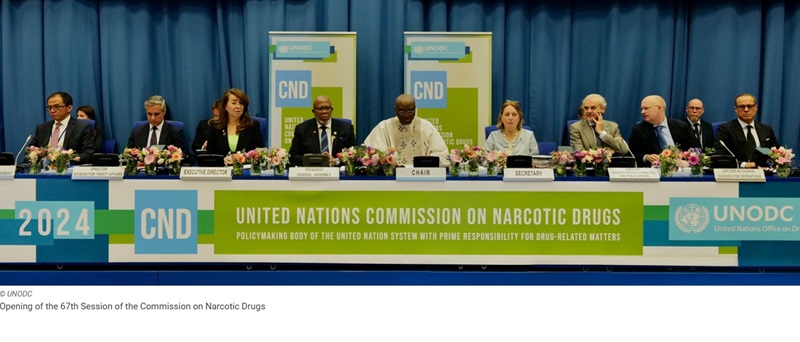Commission on Narcotic Drugs pledges action on addressing and countering the world drug problem at the Midterm Review of the 2019 Ministerial Declaration
|
|
Vienna (Austria), 14 March 2024 — The High-Level Segment of the 67th session of the Commission on Narcotic Drugs (CND) opened on 14 March 2024 with a focus on the Midterm Review of the 2019 Ministerial Declaration, with nearly 140 countries gathering to assess progress made in the implementation of all international drug policy commitments set forth in the declaration.
The 67th session of the CND began with a high-level opening with interventions from the President of the General Assembly, Dennis Francis; Secretary-General of the United Nations, António Guterres (video message); Executive Director of the United Nations Office on Drugs and Crime (UNODC), Ghada Waly; President of the International Narcotics Control Board (INCB), Prof. Jallal Toufiq; Director-General of the World Health Organization (WHO), Tedros Adhanom Ghebreyesus (video message); and United Nations High Commissioner for Human Rights, Volker Türk.
The importance of multilateralism
The Chair of the Commission, H.E. Philbert Johnson of Ghana, opened the discussions by stressing that: “In the current global landscape, marked by unprecedented complexities and interconnected challenges, the importance of multilateralism cannot be overstated. The world drug problem is a multifaceted issue that transcends borders, affecting millions of lives across nations. It is a stark reminder that no single entity, no one nation, can confront this challenge in isolation. It is through international collaboration, cooperation, and solidarity that we can achieve sustainable solutions.”
“I cannot over-emphasize that we should seize this moment to reimagine multilateral cooperation, and to secure a better future for both the present and future generations,” said the President of the General Assembly Dennis Francis.
Putting people first
In his video message, António Guterres called on Member States to strive to put people first, by ending stigma, discrimination and stressing prevention, stressing rehabilitation, upholding human rights of people who use drugs, and expanding prevention and treatment programmes, and all services.
In her opening remarks, Ghada Waly underscored the need to promote effective responses that respect the rights and dignity of all, without surrendering the health and security of our communities to drugs and drug traffickers.
“The international drug control conventions have a timeless goal at their heart: the health and wellbeing of humankind,” she said. “And they represent a global common ground, at a time when international cooperation is needed most. In this time of divisions and frictions, I urge you to appreciate the value of having a common framework, and to unite around that framework.



